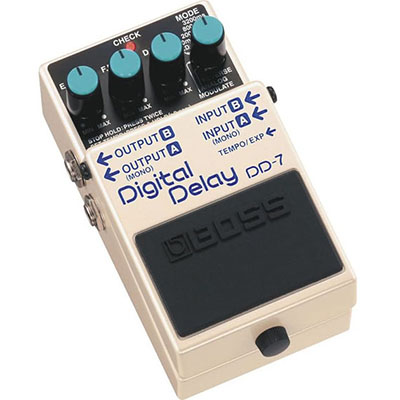
By Ed Malaker
Posted 03/15/2019
Delay is created in many ways – including electronically – with springs, or tape (like in a cassette or audio reel).
Delay/Echo
Delay is a very common effect that creates an echo of the original signal. Delay can often be set to very short time, creating a “guitar doubling” effect, or it can be set for very long times creating a “Grand Canyon” type echo. It can also be (and is commonly) set for a single echo or “Slap Back,” or for multiple or even infinitely repeating echos. Take a look at the MXR M169 Carbon Copy Analog Delay, or Boss DD-7 Digital Delay Pedal.
Looper
A Looper pedal is designed for a performer who wants to record a section of music and play over it while it loops continuously in the background. It has controls to Record, Start, Stop, and Erase the recording so that it can be used “on the fly” during a performance. Many pedals also allow you to store loops that you can recall at a later time. Take a look at the BOSS Audio RC-3 Loop Station Pedal, or Digitech JMSXT Jamman Solo XT Stereo Looper Phrase.
Reverb
Reverb is probably the all-time most-used (and overused) effect for any instrument or vocal. Reverb attempts to emulate the way that we naturally hear sounds in different rooms, using springs, large metal plates, electronics, etc. Many of our guitar amps have a Spring Reverb built in. Spring Reverb uses a spring attached to what is basically a speaker on each end to achieve a very unique, but still very natural-sounding reverb. Many modern pedals are switching to Digital electronics which really opens up a world of possible Reverb emulations. Take a look at the Electro-Harmonix Holy Grail Neo Reverb pedal, or Digitech POLARA Lexicon Reverbs Stereo Pedal.
If you’ve found this article helpful, please feel free to share this with your friends on Facebook and Twitter. For more articles on guitar electronics, visit humbuckersoup.com.
